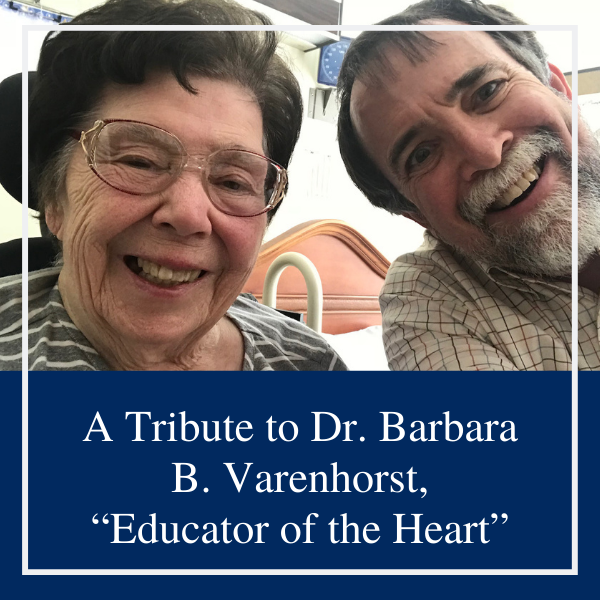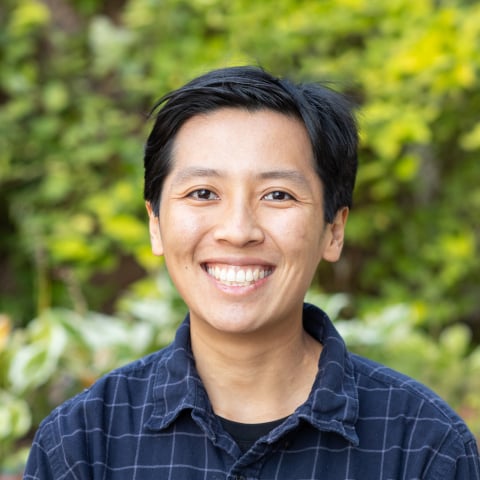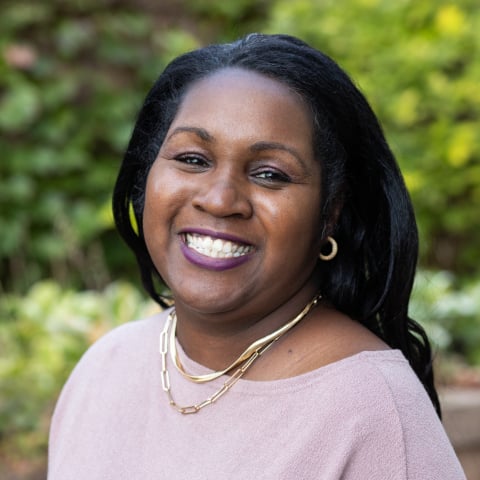Blog
A Tribute to Dr. Barbara B. Varenhorst, “Educator of the Heart”
By Eugene C. Roehlkepartain, Ph.D., Senior Scholar
Many people have influenced Search Institute’s work across our 60-plus years. But aside from staff, the person with the greatest influence on our work across multiple decades has been Dr. Barbara B. Varenhorst, who died last week at age 92.
To understand why, it helps to start with the near-mythical “origin story” she liked to tell.
It Started with Listening
After completing graduate school in 1964, Barbara began working as a guidance counselor in the Palo Alto, California, schools. Fairly quickly, she started feeling like she wasn’t making much of a difference. The students simply weren’t coming to her—or any of the counselors—to work through their issues. She didn’t know why.
Using her moxy and intellect, she secured funds to find alternative approaches. And she started by talking with students. But, “I didn’t want to hear what they said,” Barbara often recounted when telling the story. “I wanted to hear that they needed us.” Instead, the students told her that when they were dealing with a problem, they didn’t even think of going to a counselor. They first went to their friends.
(None of that seems particularly revolutionary 50+ years later. And that’s the point. It shows how much influence Barbara and those who followed her have had.)
But that’s not where the story ends. As she probed more deeply with the students, Barbara learned that friends often weren’t very helpful either. They wanted to be; they just didn’t know how. So, she thought, “why not teach them to help their friends?”
Out of those conversations grew Barbara’s first high school “peer counseling” groups. Hundreds of youth would voluntarily sign up for a 12-week, intensive after-school class to learn relationship skills and how to help a struggling friend. Those early experiments led her, along with others, to build what became the field of peer counseling, then peer helping, and other variations that equip young people (and adults) with relational skills aimed at personal growth, connecting with and helping others, and developing leaders.
Interwoven Stories
In retrospect, it’s easy to see how Barbara’s story became woven into Search Institute’s story. By the early 1970s, she was deeply involved with Search Institute as a trainer and consultant on relationship issues for youth and families. She joined our Board of Directors and served for many years (likely much longer than current bylaws would allow). Through the 1990s and beyond, she championed Developmental Assets in her home community and across California. When we began to focus on developmental relationships in 2013, we went to her not only for guidance in shaping our peer relationships work, but also to infuse her wisdom throughout the Developmental Relationships Framework.
When I visited with her in 2018, not long after a stroke that forced her to leave her home, she was courteous and warm in updating me on how she was doing, and she was genuinely interested in me, my family, and my colleagues. Her eyes sparkled with energy as I described the progress we were making in our research on developmental relationships. She was interested in all of it, including relationships in families, in schools, in youth organizations, in faith communities, and among peers. She kept a sharp eye and gave critical feedback (which she always said was part of a strong relationship), remaining committed to ensuring that what she had learned across her lifetime could inform our work.
Some Lessons I’m Learning from Barbara
Barbara would often describe herself first as an educator. When I reflect on some of what I am still learning from Barbara, four lessons, out of many, immediately come to mind.
1. You’re never too young or too old or too . . . anything. Barbara saw each person she met as uniquely valuable and able to contribute, no matter their age. Whether they were elementary children who she taught relational caring skills; or senior citizens who asked for the same training; or young people with disabilities who became transformative leaders, Barbara believed each and every person had something to give. More than that, I think she believed each person has a responsibility to contribute, to be civil, and caring—to look out for each other—no matter who we are, what our background is, or who the other person is. It’s how she sought to live throughout her own long life.
2. Cultivating high-quality relationships isn’t easy. In fact, it’s really hard to learn how to nurture deep, meaningful relationships. It requires reflection, learning new ideas, and practicing new skills. That takes practice, patience, humility, and more. Barbara resisted the idea that you could simplify everything just because everyone wants it to be simpler. She understood the complexity and multiple dimensions of relationships. She knew the impact of a well-worded question compared to a sloppy question. She knew the danger of exposing vulnerability without adequate trust, trustworthiness, integrity, and competence. She knew the importance of investing in learning how to more effectively cultivate relationships, even as she knew the resistance there would be to making that investment. And most of all, she knew the transformative power and lasting impact that was possible when those investments were made.
3. Relationships are essential everywhere. Some of Barbara’s favorite stories were about graduates of peer programs who would write to her 10, 20, or 40 years later. They would be in some unexpected, often high-powered job. High stress. Chief scientist. Judge. And they would tell her something like: “Every day I use the skills you taught me in our peer group. I couldn’t do my job without them.” And she would beam!
Then she would pause briefly, and shift to also recount stories of others who were using the same skills in more ordinary (but equally magical) ways, such as parents, teachers, and the staff who were caring for her after her stroke. She would point out how much she appreciated their care and their conversations. And she was still beaming.
4. Cultivating relationships is an “education of the heart.” Barbara bristled at any suggestion to water down relationships or made them more transactional or tactical. Relationships were an “education of the heart,” Barbara often said, as have others. When you are entrusted with relationships, what you do will deeply touch the spirit, the soul, or the core of who people are and how they see themselves. That is a profound responsibility and a trust that has been too often broken.
To be sure, Barbara was very practical in teaching skills to listen deeply, resolve conflicts, be appropriately assertive, and more, as she does in the book she published with Search Institute. But for Barbara, these skills must be steeped in values and commitments such as honesty, integrity, justice, and fairness that are essential to being human and are essential to human relationships. Relationships, ethics, and character were, for Barbara, inseparable.
That commitment to relationships, ethics, and character wasn’t just what Barbara taught. It’s how she lived her life. And it’s why she leaves such a powerful and lasting legacy in the lives of the thousands of people who saw her as a teacher, mentor, and friend.
Read Barbara’s obituary from her family.



